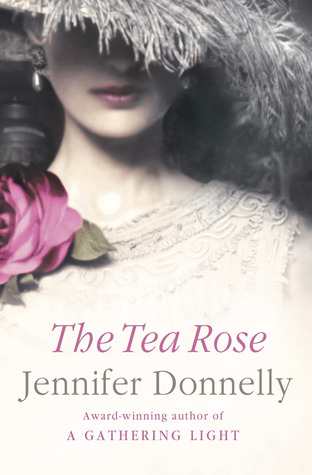 This book came to me by way of a Little Free Library in our neighborhood; I will be keeping it, so I returned on a later day and put a couple of other good books in it in return! Two main components attracted me to the book: first, its sheer length, and second its theme of a strong female character fleeing a killer and rising to the top of her field in the process.
This book came to me by way of a Little Free Library in our neighborhood; I will be keeping it, so I returned on a later day and put a couple of other good books in it in return! Two main components attracted me to the book: first, its sheer length, and second its theme of a strong female character fleeing a killer and rising to the top of her field in the process.Heroine Fiona Finnegan grew up in Whitechapel, her father working in the docks and Fiona packing tea in a factory, her younger teenaged brother also picking up work and her mother doing laundry. They work hard and they are not rich, but they are relatively secure and happy as long as they can keep on keepin' on. Fiona and her sweetheart, Joe, hope to save up enough money to open a shop one day, and everything actually seems pretty hunky-dory. Except Jack the Ripper is killing women in Whitechapel, the unionizing dockworkers are headed for ruin at the hands of the head of Burton's Tea Company, and another girl has her eye on Joe and is willing to use his own ambition to get him. After Fiona loses absolutely everything in quick succession, she's forced to flee to her uncle in New York, where she vows to start again and reestablish herself as a strong independent woman who don't need no man and who can be her very own business woman and tea mogul. And of course, the story also wends its way to Joe and Fiona eventually, 500-and-some pages later, getting their happy ending.
This is one of those historic family saga novels, and luckily for me, it was much better than the other one I was reading at the time, Crescent City. The writing was much more engaging and Fiona was a main character who actually did things instead of just sitting around and sighing at her lot in life. Fiona has ambition, and she has wits. Of course, Donnelly takes this too far a few times--Fiona pretty much single-handedly invents the assembly line, the tea bag, the advertising campaign...you know, the whole shebang. Honestly, Fiona's character was strong enough to stand up without these things, but fiction often has this weird thing where a female character has to be the absolute best at everything she does or she's not considered strong, which is ridiculous but apparently unavoidable in books, because this is definitely not the only place this is true.
Integrating the mystery of Jack the Ripper here was an interesting aspect--we always know who's behind the murders, but the characters do not, which helps to build tension at the points that the subplot gets woven in. There is, of course, also a subplot involving Joe, but I didn't like that one as much, nor did I like that Donnelly was so obviously pushing Fiona and Joe back together. Fiona forgave Joe for his actions earlier in the book, but I never did and that kind of put a bit of a damper on their "happily ever after." I really thought Fiona would have been better off with Will, but apparently I don't get to make those sorts of demands. Sigh. Nick, on the other hand, was a lovely supporting character; Donnelly somewhat fell into the "bury your gays" trope here, but not as badly as some other books I've read recently and Nick did get somewhat of a reprieve.
There was also a weird time jump; the first two parts of the book continue on in an orderly fashion, but when the third starts we're given a "ten years later" treatment, which was a break in the pacing and lent a strange feel to the final third. We didn't get to see the characters grow or evolve during those ten years, and I'm not entirely sure why Donnelly went with this instead of maybe just doing a few smaller ones spread throughout the final part, which could have really accomplished the same thing but structured it differently.
Still, I quite liked this book, and already picked up the two sequels which deal with other characters introduced here, The Winter Rose and The Wild Rose.
3.5 stars out of 5.
No comments:
Post a Comment